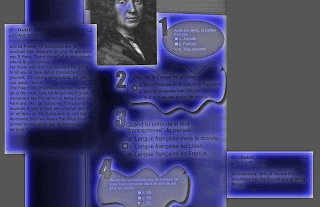Thursday, 29 December 2011
Friday, 23 December 2011
Monday, 19 December 2011
Skepticism
The demand of knowledge has always been the first concern of philosophy. It is related to the concept of truth, which in turn constitutes the basics of human life. However, questioning that truth has never been accepted by the great occidental philosophers until the Greek sophists and the skeptical schools appeared and shaped this idea. So liberating the mind from the ideas that maintained the indubitable knowledge of truth and cognitive certainty was by no means a modern theory presented by Descartes, and actually it formed the classical dogma of classical philosophy with Aristotle, and with particular emphasis in St. Augustine and all over medieval philosophy. (Seifert, Josef. "From Relativism and Skepticism to Truth and Certainty." Truth Journal. 2002). So how do we define skepticism, And what is the position of skepticism on the subject of truth and certainty of knowledge?
To be a skeptic is simply to doubt any sort of certainty about truth and reality. It is about rejecting any beliefs in things that have not been appropriately shown to exist or demonstrated to happen. Whether or not that assumption is accepted depends on whether or not you believe the thing in question, but this is not up to science to decide. Those truths that follow from the modern science are not necessarily illustrations of indubitable certainty.
Sunday, 18 December 2011
The challenge of freewill
You wake up in the morning and you start making all kinds of choices: what to do, where to go, what to drink, what to eat, what to wear... If you forget one thing (let's say your laptop), you feel it was your fault and you are responsible for it (the act of forgetting) You start blaming yourself. Most of us consider that we have free will and we are certain about it. "YES IT EXISTS" It is known to be the power of choosing the course of action. But is it simply this power, which allows us to control our events, so what determines the free will, then? Our brain ?! Our motives ?! Our entourage ?!
This article gives a brief examination of how freedom of actions relates to free will. It also explores an argument for Libertarianism questioning the human actions and the subject of causality. It will then confront it with two arguments for hard determinism based on the relationship between human actions and prior events of the person.
This article gives a brief examination of how freedom of actions relates to free will. It also explores an argument for Libertarianism questioning the human actions and the subject of causality. It will then confront it with two arguments for hard determinism based on the relationship between human actions and prior events of the person.
Saturday, 17 December 2011
Friday, 16 December 2011
Type Ia supernova
On August 24, 2011, astronomers discovered a nearby Type Ia supernova--the earliest detection ever--with help from a machine-based real-time classification system. The early detection and close proximity of the stars set the stage for unprecedented observation of the initial stages of a Type Ia supernova.
Supernovae are extraordinarily bright stellar explosions that signal the death of a star and there are several different types. Type Ia supernovae have similarities that allow astronomers to use them as standards when comparing the distances of objects in the sky, however little is known about the stars that produce them or how they behave when they explode. Models of Type Ia supernovae assume they are formed from two-star systems in which a very dense, very small star called a white dwarf orbits a companion.
This supernova, named 2011fe, occurred in the Pinwheel galaxy, which is located in the "Big Dipper" within the Ursa Major constellation. Early detection gave astronomers the extraordinary opportunity to observe the evolution of the brightness and spectra of the energy emitted from the explosion over time. Based on these data, researchers were able to approximate how big the star was and when it exploded, in addition to details about the companion star in the system.
NSF's Cyber-Enabled Discovery and Innovation (CDI) program, with the goal of building computational tools with concrete scientific returns in mind, supported the computational framework that enabled this discovery. The framework could form the foundation for applications in other fields with similar demands and constraints, such as high-frequency financial data, robotics, medical signal monitoring, geophysics, weather and particle physics.
Sunday, 11 December 2011
Wednesday, 7 December 2011
Tuesday, 6 December 2011
Friday, 2 December 2011
Engineering For Change
Inside a water-pump repair shop in Kenya
The latest in the series The Fixers, a documentary project on electronic waste in Africa reported on The Atlantic's Web site, takes us inside a shop where a creative handyman fixes pumps with whatever is available. _____________________________________________
AirDrop Irrigation wins the Dyson Award
A low-tech moisture harvesting device for drought-prone and otherwise dry farms took the James Dyson Award this month.
Subscribe to:
Posts (Atom)









